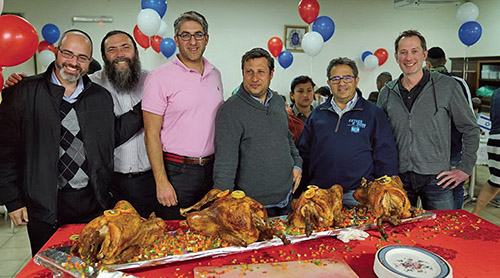




Almost annually, I have the privilege of leading a father-son chesed mission to Israel, comprised of soon-to-be bar mitzvah boys and their fathers from our community in Englewood. As the boys prepare to accept the full obligation of Torah and mitzvot, the mission offers a valuable opportunity to reinforce core Torah values. Every year, our mission visits a number of worthy organizations throughout Israel doing inspirational work; this year’s trip, which took place during the week of Thanksgiving, was no exception. We had most memorable experiences. We toured the Moslem Quarter of the Old City with the Jerusalem Reclamation Project, had lunch in the Knesset MK cafeteria with Minister Tzachi Hanegbi and MK Michael Oren, visited the towns of Bet El and Shilo, brought dinner to the IDF soldiers of Netzach Yehuda on a pillbox tour; learned safrut with Rav Yosef Zvi Rimon of The Halacha Center, practiced anti-terror lessons at Caliber 3, celebrated Thanksgiving with Emunah’s Bet Elazraki Children’s Home in Netanya, visited multiple museums and experienced Shabbat Chayei Sara in Chevron at Yeshivat Shavei Chevron.
Israel is a land of heroes. When we spent time with the soldiers of Netzach Yehuda we saw how members of our own community can become heroes. Near the outpost of Aish Kodesh there is a pillbox. Four soldiers man the post. One is always awake monitoring the road. The others use the time to catch up on sleep. There are no beds in the pillbox. The soldiers sleep in sleeping bags on the winding staircase leading to the top of the tower. One of the soldiers we met was Elisha Rudolf from Chicago. He is an alumnus of Yeshivat Torat Shraga and a friend to many in our community. Now he is a volunteer soldier living in tough conditions to protect our homeland. An American-born inspiration.
One of the highlights of our trip was meeting with the Toweg family in Moshav Azarya. Our shul recently adopted the Toweg family farm as part of the adopt-a-farm initiative of the Shmita Fund. We hope to support the Towegs and to strengthen the bond between them and our community. Doron and Ilana Toweg have a large farm. They cultivate more than 20 acres. During our visit we learned that the Towegs had a standing contract with a major Israeli food company to supply a million shekels worth of eggplant each year. When they considered keeping shmittah kehilchata two years ago, the company threatened to terminate the contract for the years following shmittah as well.
The decision to keep shmittah was originally Ilana’s idea. Doron wasn’t sure he could do it, both financially and in terms of the emotional distress of seeing his carefully cultivated farmland in disarray, overrun with weeds. Doron finally acquiesced, but not before he had planted a new crop of eggplants, at significant expense, during shmittah. Doron eventually decided to keep shmittah with all its stringencies. He stopped watering his eggplants, even though they had already begun to grow. Rabbis told him he was to destroy the produce since they were s’fichei shevi’it. He performed the difficult task.
People in neighboring towns heard about the Towegs and their dedication to keeping shmittah, their faithfulness and willingness to sacrifice even to the extent of losing a one million shekel annual contract. The Sages teach that farmers who keep shmittah achieve a special degree of holiness. It was not long before people started arriving to ask Doron for a bracha. The first two bracha-seekers were young, unmarried women who had not yet found a husband. Doron suggested they ask Ilana instead, because keeping shmittah was her idea, and without her he would never have done it. Ilana insisted that Doron, as the active farmer, should give the bracha. In the end Ilana agreed to pray for the women while she lit her candles on Friday nights. Two weeks later, one of them found her soulmate. A month later the second one got engaged. Word quickly spread, and dozens of people started arriving each month, then hundreds. Ilana kept a growing list of people to daven for when lighting Shabbat candles each Friday night; soon, her licht benching took so long that she still hadn’t finished by the time Doron returned home from Kabbalat Shabbat in shul.
A class of young girls came to visit the farm. The teachers told the girls about the power of farmers who keep shmittah. Both teachers had not had a child for years. One had endured six years without a child, the other 16. They asked Ilana for a blessing. Nine and a half months after the blessing, they both delivered baby boys on the same day.
The Towegs estimate that over 3,000 people came to them for a blessing during shmittah. In our visit with Ilana and Doron, we definitely feel we were the ones strengthened and inspired. Based on our experiences so far, I strongly encourage other synagogues to consider taking part in this amazing initiative. Every shmittah-observant farming family has its own unique and inspiring story. The opportunity to develop a personal relationship with these holy farmers and to become part of their story is a blessing not to be missed.
In Chevron we kept singing “Biglal avot toshia banim,” for the sake of the fathers, save the children. Perhaps “fathers” in the song refers to two concepts. One, our past and legacy. In the merit of those who came before us may we be blessed. But it also refers to the parent-child relationship. May we all, in the merit of parents and children bonding with each other and with Torah, see blessings for our nation.
By Rabbi Zev Reichman
Rabbi Zev Reichman is the rabbi of East Hill Synagogue in Englewood. More information on The Shmitah Fund and its work with Israeli farmers can be found at www.shmitahfund.org; inquiries about the adopt-a-farm initiative should be directed to [email protected].













